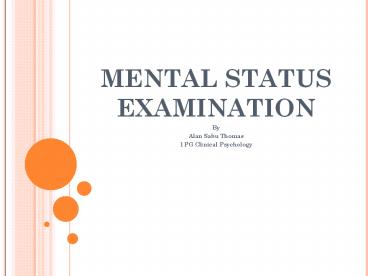MENTAL STATUS EXAMINATION PowerPoint PPT Presentation
Title: MENTAL STATUS EXAMINATION
1
MENTAL STATUS EXAMINATION
- By
- Alan Sabu Thomas
- 1 PG Clinical Psychology
2
Mental status Examination
- Clinicians use the term mental status examination
to refer to what the clients thinks about and how
the client thinks and acts - Not present in a standardized form .
- Areas covered
- 1.Behaviour
- 2.Orientation
- 3.Content of thought.
- 4.Thinking style
- 5.Language
- 6.Affect and mood
- 7.Perceptual experience
- 8.Sense of self
- 9.Motivation
- 10.Intelligence
- 11.Inight
3
APPEARANCE AND BEHAVIOUR
- Movement of the persons body
- Level of activity
- Hyperactivity
- Compulsion Repetitive and seemingly purposeful
behavior that is performed in response to
uncontrollable urges.
4
ORIENTATION
- Its a persons awareness to time ,place and
identity . - People with mental disorders are disoriented.
- They are out of touch with the basic facts about
themselves and their surrounding
5
CONCENTRATION AND ATTENTION
- Reading and writing The patient is asked to read
a sentence. He is also told to write a sentence
in full and complete sentence. - Visuospatial ability copying a figure exercise
is done. - Abstract thought Abstract thinking is the
ability to deal with abstract concepts. Example
similarities between truth and beauty. Answers
could be overtly abstract or concrete. Brain
damaged individual become extremely emotional and
cannot think abstractly.
6
AFFECT AND MOOD(affect outward expression of
emotional feeling)
- Feeling state becomes affect when others observe
it. - Mood refers to the experience of emotion the way
the person feels inside. - Assessment of mood important as it has got a lot
of diagnostic and treatment significance - Euthymic mood
- Dysphoric mood
- Euphoric Mood
7
AREAS OF AFFECT
- Appropriateness of Affect The extent to which a
persons emotional expressiveness fails to
correspond to the content of what is being
discussed. - Intensity Degree of the affect
- Mobility Ease or speed with which people move
from one kind of feeling or level of emotional
intensity to other. - Range- Refers to the broad range of affect and
the ability to communicate sadness, anger
,agitation ,or calmness as the situation or
discussion warrants
8
COGNITIVE FUNCTIONING
- Sensorium and cognition Seeks to assess brain
function ,including intelligence, capacity of
abstract thinking, level of insight and judgment
and insight . - Consciousness Disturbance of consciousness
indicate organic brain impairment. - Clouding of consciousness Overall reduced
awareness of environment ( frequently not as a
fixed mental state) - Altered state of consciousness show some
impairment of orientation. - Others states of consciousness include
somnolence, stupor, coma ,lethargy, or alert
9
INFORMATION AND INTELLIGENCE
- If the individual is suspected with cognitive
impairment ,he or she would be asked to deal with
mental task such as counting the change got after
a purchase of 6.7 using a 10 note. - Intelligence determined by
- 1.Word Vocabulary
- 2.General Fund of Knowledge
- 3.Educational level
- 4.Socioeconomic status
- Handling a difficult or sophisticated concept
can reflect intelligence of an individual without
formal education or extensive fund of knowledge.
10
MEMORY
- Assessment of Memory is divided into four areas
- 1. Remote memory
- 2. Recent memory.
- 3. Recent past memory.
- 4. Immediate retention memory.
- 5. Recall
- Order of destruction of memory
11
PERCEPTUAL EXPERIENCE
- Hallucinations False perceptions of not
corresponding to the objective stimuli present I
environment . - Command Hallucination
- Visual Hallucination
- Olfactory Hallucination
- Somatic Hallucination
- Gustatory Halluciantion
- Illusions-Misinterpretation of a real object
,such as misperceiving a tree to be a man in the
dark.
12
CONTENT OF THOUGHT
- Important for assessment
- Takes place when the psychiatrist converses with
the patient. - Questions also asked Do you have anything in
your head ,that you cannot bring out - Important areas
- 1.Obsessions
- 2.Delusions
- 3.Magical thinking
- 4.Violent Ideation
13
THINKING STYLE AND LANGUAGE
- Clues for thinking style and language ought to be
found out - Includes information on clients vocabulary
- Sentence structure
- Psychiatrist would have a tough time grasping
words of a psychiatrist
14
SENSE OF SELF
- A number of psychological disorder alter
individuals identity or sense of who am I - Depersonalization Refers to the an altered
experiences of self ,such as feeling that ones
body is not connected to ones mind. - Identity Confusion Lack of sense of who one is.
- MOTIVATION
- Psychiatrist assess the motivation of client ,by
assessing how strongly he or she desires a
lasting personality change or relief of emotional
distress. - Some individual prefer to remain in their present
rather than face their past or future.
15
IMPULSIVITY
- Questions such as Is the patient capable to
handle and manage sexual, aggressive, and other
impulses ? - Its important fro determining the awareness of
socially appropriate behavior and a measure of
patients potential danger to self and others. - Impulse control can be estimated from the
information in the patients recent history and
from behavior observed during the interview.
16
INSIGHT AND JUDGEMENT
- Attempts made by psychiatrists to know the degree
to which individuals knows the nature of his/her
disorder. - Needs to get patients receptivity to the
treatment. - Insight, understanding and awareness about
oneself and ones world. - Judgment is intellectual process in which an
individual considers and weighs the option to
make a decision.
17
THANK YOU

